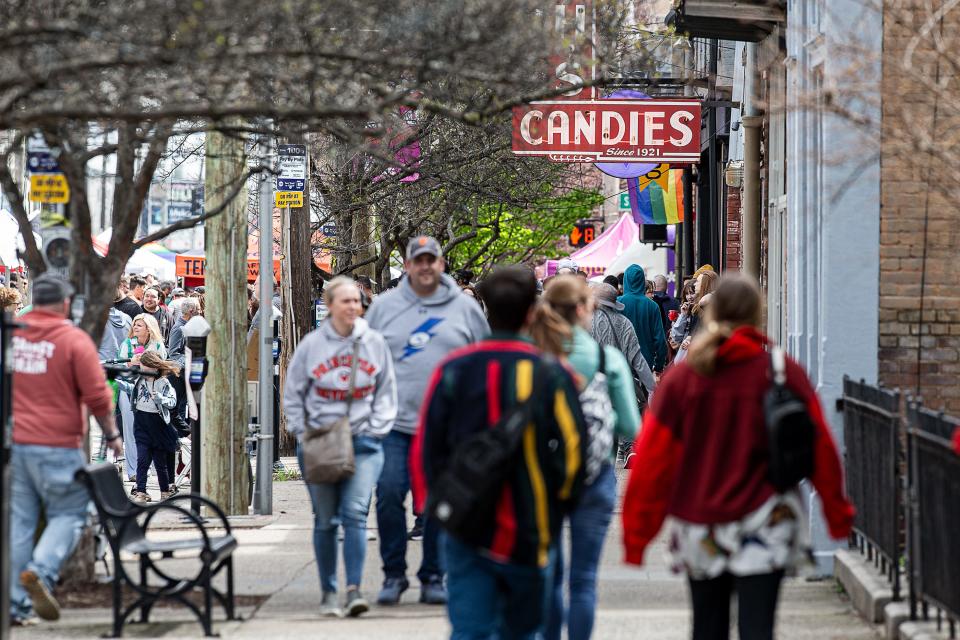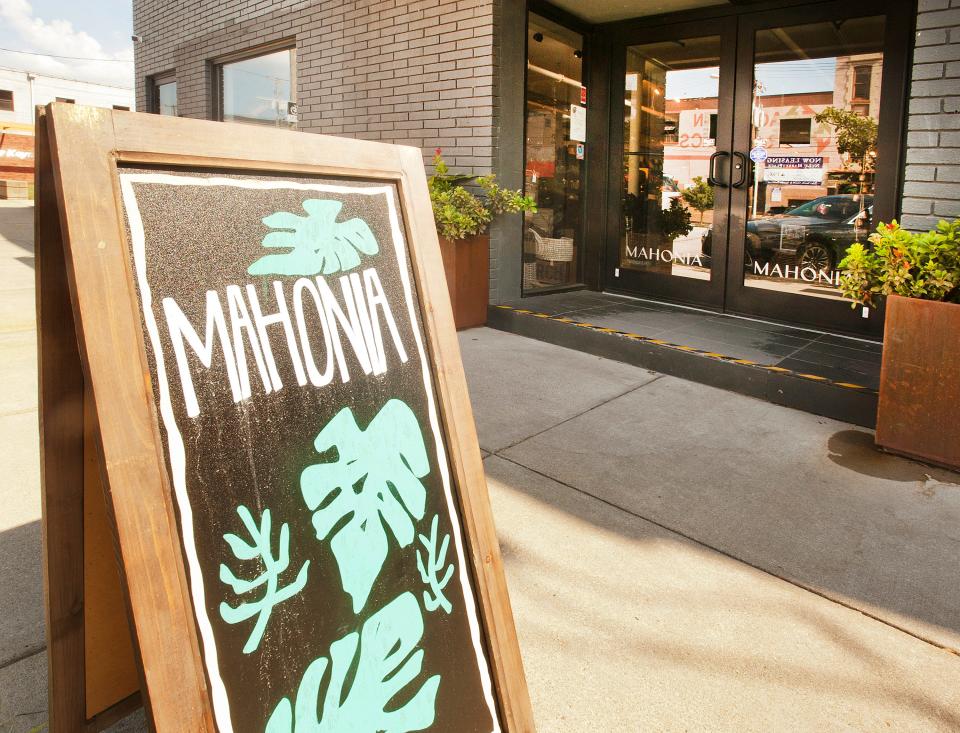Tax bump for more services? NuLu considers new tax to support neighborhood growth
NuLu has seen immense investment in recent years with an influx of hotels, new shops, and eateries.
That growth as a destination for tourists and locals alike has brought with it a desire for more resources to pour into the area just east of downtown Louisville. Now, the NuLu Business Association is in the early stages of seeking a self-imposed taxing mechanism through which the neighborhood could reap extra dollars to reinvest in the growing area.
If imposed, property owners would pay additional taxes in exchange for additional services that could include beautification, maintenance of public spaces, marketing, and events.
The "NuLu Management District" would stretch roughly five-by-two blocks in the East Market District, from Baxter Avenue to Hancock Street and from Jefferson to Main streets.
Here’s a primer on what’s proposed and how it could impact the NuLu businesses ahead of an informational community meeting on Sept. 12:
What is a business improvement district?

Established by state law in 1990, management districts (called business improvement districts in most other states) are areas in which a self-imposed specially assessed tax goes to fund services in a defined geographic area.
Property owners vote to establish one of these districts and then pay an additional tax that’s based on their property’s assessed value.
The money that’s collected can go toward any number of economic improvement efforts, defined broadly to include (but not be limited to) efforts involving security, beautification, capital improvements and business development. Collected funds would stay and be spent within the geographic area.
Services added as a result of the district are in addition to, not in place of, already existing services provided by the city. State law prevents the reduction of publicly funded services in a management district unless such services are cut city-wide.
Other nearby metro areas, including Cincinnati, Nashville, and St. Louis also use the mechanism to bolster downtown services.
Why are NuLu businesses seeking a BID?

As NuLu has grown in popularity, so has the interest in providing extra resources for the area, said Ken Herndon, NuLu Business Association member.
“Even with success comes issues that need to be dealt with, and a BID is one way to address those needs and keep the momentum going,” he said. “We’re fortunate that we’ve got a good thing going there, and we realize that and we want to make sure that we keep it not just for our neighborhood but we continue to be an asset for the whole city.”
The topic has been discussed for years but the current push is the first serious attempt at establishing the district.
Having moved to the NuLu area in 2021, Herndon was sought out by the NuLu Business Association to join the group and lend his expertise to the management district effort.
Herndon was a longtime employee and is now a current contractor for Louisville’s existing management district, the Louisville Downtown Management District.
While the proposed NuLu district would be smaller in size than the downtown version, the use of on-the-street ambassadors and public beautification efforts, for example, would be similar, he said.
What would the tax rate be?

The current proposal is set at 14 cents per every $100 of assessed property value. Such values are determined by the Jefferson County Property Valuation Administrator.
That means a property with an assessed value of $500,000 would see an additional $700 in taxes to support the management district. Property owners would see the new tax on their annual property tax bill at year’s end. It would apply to commercial and residential property owners alike. It would not apply to renters.
The rate was calculated by first estimating the total amount of money the district would need to successfully offer services. Herndon said the business association sought an estimate from Block by Block, a company that provides “ambassador” staffing services. The company is active in more than 30 states and provides services to other business improvement districts across the country.
Working backward, the business association analyzed property values to determine what rate would be needed to reach that estimate of $331,800.
Who would oversee the collected funds?

The proposed NuLu Management District would be overseen by a board of directors no bigger than 15 members, two-thirds of which would be property owners or their representatives.
Other members would include owners, managers, or operators of retail businesses, restaurants, and other non-retail, non-restaurant businesses.
The mayor, director of the Department of Public Works, the senior officer over Louisville Metro Police’s First Division and Metro Council member representing NuLu (currently Jecorey Arthur) would also have seats.
This body would be charged with steering the direction of the district, its initiatives and spending. State law requires an annual detailed budget to be submitted to local legislative bodies for approval.
Where else in Louisville are there business improvement districts?

Downtown is home to the oldest management district in Louisville.
The Louisville Downtown Management District was created in 1991 by a City of Louisville ordinance. It covers much of the downtown Central Business District and has an 8.31 cent tax per $100 of valuation.
The Louisville district contracts with Block by Block to provide ambassadors downtown. This team wears various hats, from litter cleanup and graffiti removal to acting as a friendly face to tourists, downtown visitors and business owners.
Another, more narrowly defined district, is also in effect in Louisville: the Greater Louisville Lodging Management District. As the name suggests, this district was formed late last year to benefit hotels with 51 rooms and more via a 1.5% tax on gross short-term rental revenue.
The Louisville Hotel Association petitioned for the creation of the non-contiguous district to help fund sales, marketing, programmatic and advocacy efforts.
Back in 2018-2019, there was an effort to establish another management district along the Bardstown Road/Baxter Avenue corridor, stretching from Broadway down to the Douglass Loop. The proposed rate was 17.45 cents per $100 of assessed value.
That effort failed with 21% of property owners voting yes, 22% voting no and the balance not voting.
Are there other business improvement districts in Kentucky?
Yes, there is at least one other such district in the state: the Downtown Lexington Management District.
The Lexington district in the downtown area was formed in 2015 and has the stated goals of fostering economic growth and interest in the area, as well as raising property values, through beautification, safety and marketing efforts, including “street service requests” and project grants.
What’s next?
Because of the time it takes to get a management district off the ground ahead of tax collection season, Herndon said, advocates are continuing to lay the groundwork in the coming months ahead of an early summer 2024 submission to the Louisville Metro Council.
State law requires the support of one-third of property owners in the district, and those in support must make up at least 51% of the area’s total assessed property value.
Current estimates count nearly 150 property owners in the proposed NuLu district and more than $230 million in assessed value. As of September, Herndon said, advocates have secured support from about 13% of property owners representing about 10% of the area's assessed value.
If the business association has the votes necessary, it would submit a petition to the Louisville Metro Council, which would then trigger council meetings and a public hearing. Part of the petition would be an “economic improvement plan” detailing what types of improvements would be offered by the district and their costs.
Should the effort win council approval, the district would be created with the new tax assessment added to bills going out in late 2024, forming the basis of the pool of funds available to spend in 2025.
An informational community meeting is set for 5:30 p.m. Sept. 12 at the AC Hotel, 727 E. Market St.
Growth & development reporter Matthew Glowicki can be reached at mglowicki@courier-journal.com, 502-582-4000 or on Twitter @mattglo.
This article originally appeared on Louisville Courier Journal: NuLu seeks business improvement district tax to support neighborhood

